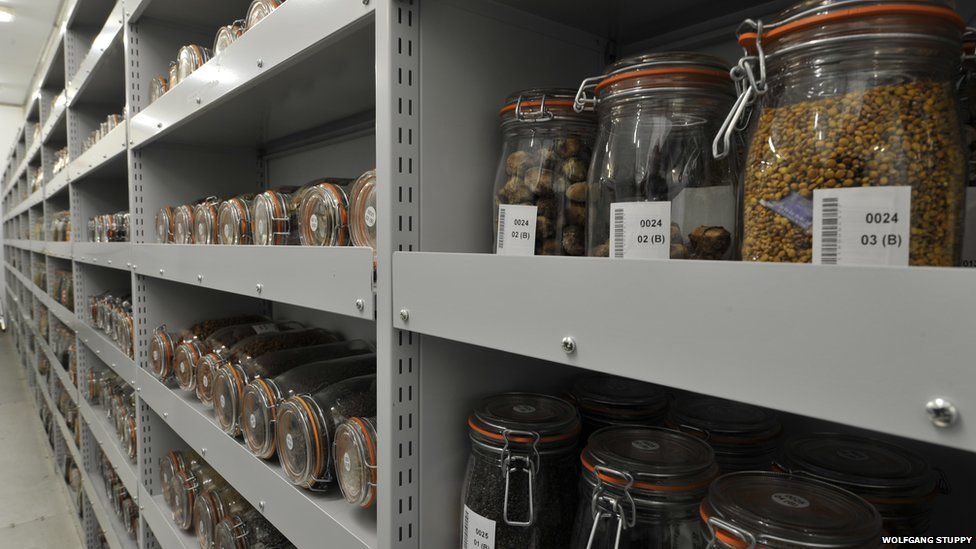Seeds hold hidden treasures for future food
- Published
- comments

More than 70,000 of the world's most precious seeds have been sent from the UK's Millennium Seed Bank to the Middle East, in its largest export to date.
The consignment contains more than 50 wild relatives of cultivated crops, such as wheat, barley and lentils.
The seeds will be used for food security research at a seed bank in Lebanon, which is recreating collections stranded in Syria.
The Millennium Seed Bank at Kew is the world's largest wild plant seed bank.
Seeds from the resilient, wild cousins of modern food crops are being collected and stored in an international effort.
The aim is to breed new crop varieties capable of withstanding threats such as climate change, drought, pests and diseases.
''The real importance of these crop wild relatives is that in order to survive in the world they've had to adapt to hostile environmental changes,'' said Oriole Wagstaff of the Crop Wild Relatives project at Kew's botanic garden at Wakehurst in Sussex.
''With increasing pressures such as pests, diseases and climate change, we need to turn to these wild relatives, which have a much greater genetic diversity.''
The seeds have been removed from stores at the Millennium Seed Bank and sent to the International Center for Agricultural Research in the Dry Areas (Icarda), in Lebanon.
They include a wild wheat from Italy, a wild lentil plant from Cyprus, as well as wild relatives of the grass pea and faba bean.
At Icarda, the seeds will be used for research into improving their domesticated relatives against current and future threats such as climate change.
Hidden treasures
Scientists at Icarda are re-building what was once the largest collection of seeds from across the region, including thousands of varieties of wheat, barley, lentils and fava (broadbean).
These were kept at their former headquarters in Aleppo, where they are currently out of reach.
Back-up samples held at the Svalbard Global Seed Vault, deep inside a mountain in Norway, have helped to recreate the seed bank.
The seeds from Kew will give researchers access to precious material from wild crops, enabling the genes of living crops to be compared with their wild ''cousins''.
''These wild ones contain hidden treasures that might one day solve the threats crops are facing at the moment,'' Oriole Wagstaff added.
The Crop Wild Relatives project is a global scheme that aims to collect, conserve and utilise the genetic diversity in the wild relatives of our domesticated crops to secure and improve food crops for the future.
Marie Haga, chief executive of the Crop Trust, said conserving the diversity of our food crops ultimately safeguards the future of food for everyone.
''Genebanks have a key role to play in this process,'' she said.
''They conserve crop diversity and make it available to farmers and breeders around the world, providing the materials they need to ensure our food is plentiful, affordable, nutritious and varied."
It aims to:
- Identify where the wild relatives are found, which can be anywhere from the top of a mountain to an arid desert
- Collect them
- Safeguard them in the world's seed banks
- Share them under internationally agreed terms
- Start to use them to improve the varieties that we grow today.
The seeds exported were collected from partners in Italy, Georgia, Cyprus, Portugal, Azerbaijan and Armenia.
The work is managed by the Global Crop Diversity Trust with the Millennium Seed Bank Partnership of the Royal Botanic Gardens, Kew, and implemented in partnership with national and international gene banks and plant breeding institutes around the world.
All material collected within the project is available under the terms of the Standard Material Transfer Agreement (SMTA) within the framework of the multi-lateral system, as established under the International Treaty for Plant Genetic Resources for Food and Agriculture (ITPGRFA).
Follow Helen on Twitter.